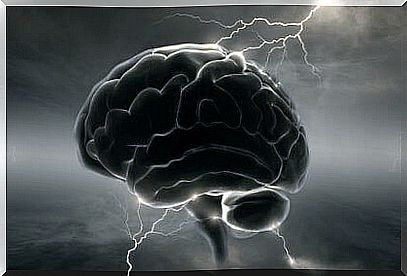Neurobiology Of The Psychopath: When The Brain Loses Its “humanity “

The brain of a psychopathic person works differently. Beyond their lack of empathy, we find other singular factors that would leave a characteristic cerebral trace in 1% of the population. According to experts, this one could present clearly significant psychopathic traits.
When we hear the term “psychopathy” we may immediately think of the names of Charles Manson or Ted Bundy. This psychological profile often becomes an object of fascination for many people. This is why films and series that revolve around this type of character arouse so much interest. Cruelty, that is to say the dark side of our ideal of humanity, intrigues us as much as it overwhelms us.
There is, however, one aspect that we sometimes overlook. Books like Are You a Psychopath? journalist and researcher Jon Ronson tell us that almost 4% of CEOs in large companies exhibit traits of psychopathy. It just means that personality psychopathy does not manifest itself exclusively in a serial killer. Or among those who make other people commit murder (as Charles Manson did).
This profile is also found in a certain number of people with whom we work or can work with on a daily basis. What’s more, as Jon Ronson explains, we live in a society that (in some cases) is oriented and structured to reward this type of behavior. That is, that of those who manipulate, deceive and come to power by taking advantage of the needs and rights of others.
You should know that this need for domination and implicit or explicit aggression does not appear by chance. There are biological bases behind this behavior and we must get to know them.

Neurobiology of the psychopath
First let’s define how a person with this personality disorder acts. A psychopath is a person who cannot or does not know how to love. He is someone who does not show empathy. Who is skilled at manipulating and lying.
These people also know all the secrets of persuasion. They normally have a very characteristic charm and act in a very concrete way in situations of anxiety or stress: with coldness. Today, we benefit from a recognized instrument to measure this dimension: the Psychopathy test according to the Hare scale. This tool allows us to assess the degree of psychopathy of each person, with 40 being the highest score.
The neurobiologist with the gene for psychopathy
This data is interesting. When we refer to the study of the neurobiology of the psychopath, it is almost obligatory to speak of a researcher. James Fallon, a neuroscientist at the University of California at Irvine, is one of the foremost experts in psychopathic personality. In fact, he is a consultant for the Pentagon and is a true reference in the study of criminal minds.
The odd thing is that the doctor has the “psychopathy gene” in his brain. He and his team have spent several years performing various diagnostic tests on a large number of recluses, trying to find these brain markers behind this type of disorder. At one point, the results were as telling as they were disturbing: Dr. James Fallon’s brains did not differ significantly from that of prisoners diagnosed with psychopathic personality disorder.
In reality, this data was not trivial. In Doctor Fallon’s family tree, we can identify 7 assassins. For example, Lizzie Borden, a woman known to dismember her parents after killing them with an ax. Thus, this famous neuroscientist, who represents an absolute reference in the field of psychopathy, personifies an idea. The psychopath’s neurobiology tells us that the cruelty gene exists but that several elements must be triggered for it to eventually manifest itself.
Let us now study a series of data which will surely allow us to understand this idea.

A brain with less gray matter
In a very interesting 2012 study at King’s College London, something Dr Fallon had already observed in 2006 in his research with prisoners has been proven. People diagnosed with psychopathy had less gray matter in the prefrontal cortex and in the temporal poles.
What does that mean? This anomaly, which is arguably the most characteristic point of the psychopath’s neurobiology, reveals their lack of empathy and the difficulty of dealing with something as important as the feeling of guilt.
Appreciate the pain of others but not your own
The psychopathic personality is characterized above all by a lack of empathy. However, in the neurobiology of the psychopath, a small nuance exists. The eople with this profile show empathy towards their own person. This is what experts from the University of Cambridge were able to see in a study published in 2013 in Frontiers in Human Neuroscience.
For this work, 121 magnetic resonances were performed on prisoners with this personality disorder. When images of people in pain were shown to these recluses, their brains did not respond. However, he reacted well when asked to imagine themselves in this same situation.
But the most amazing came later. The researchers noticed that when these people saw other people in pain and pain, there was a high level of activity in the corpus striatum. This is a very interesting part of the human brain because it is related to the reward process, motivation, pleasure and decision making.
Thus, this unusual activity in this area demonstrated something very clear: psychopaths like to see others in pain.
Is there a gene for cruelty?
There are genetic variants that define the greater tendency towards violence. For example, the CDH13 and MAOA genes. Neuroscientists at the Karolinska Institute have revealed that we can all inherit these types of variants from our parents (if they have them). However, not everyone manifests them.
- With neuroscientist James Fallon as a reference, he did have this mark in addition to other brain alterations. However, beyond certain risky behaviors and problems with impulse control, Dr. Fallon never exhibited other psychopathic traits. And maybe that’s because of his upbringing.
- James Fallon has always had a loving family. But also an entourage who knew how to educate him correctly. He never lacked tenderness, clear guidelines and an empathetic environment. And that is why he has never known trauma or deficiencies.
The neurobiology of the psychopath often tells us that this condition arises as a one-time developmental disorder. Sometimes a lack of attachment, a trauma during childhood, or any stressful and anxious situation in a child can generate a series of biochemical alterations. These determine a gradual change in the brain and behavior.
The entourage and education are decisive. Genetics affect us, there is no shadow of a doubt, but it does not determine us 100%. Moreover, according to anthropologists and psychologists, violence and psychopathic behavior are decreasing.
Three centuries ago, violent and aggressive behavior defined much of our society. Today, this behavior is on the decline. But that doesn’t mean it just goes away. 1% of the population still has the trait of psychopathy.










